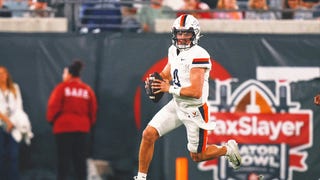MINNEAPOLIS – With Indiana in the midst of perhaps the best season in the baseball program's history, coach Tracy Smith had an admission to make before the Big Ten tournament began.
If the top-seeded Hoosiers don't win the double-elimination draw this weekend, well, he wouldn't mind all that much.
"Don't think that we're not going to win this thing. I don't want that to get out there. But there's that small piece of me that says I wouldn't be that disappointed because I think that's good for our conference," Smith said. "The more we get in the NCAA tournament, the better we're all going to look."
Largely because of obvious geographical factors, baseball has never been one of the Big Ten's strongest sports. Southern and western schools have long dominated on the diamond.
This year, though, the quality of the conference is up. Each of the six coaches assembled in Minnesota on Tuesday for the Big Ten tournament spoke from their own perspective about the league being as good as they can ever remember. Strong enough, they've been hoping, to send a handful of teams to the NCAA tournament.
The Hoosiers (40-13) are the top seed and all but guaranteed a spot. They're 12th in the latest Baseball America national poll, and their ranking in the Ratings Percentage Index that steers NCAA tournament selection criteria is 14th. Fifth-place Illinois is 30th. Michigan State (33-17), which finished seventh and missed the cut for the conference tournament, has the 36th-best RPI score and thus a chance to be selected.
If No. 2 Ohio State, No. 3 Nebraska, No. 4 Minnesota or No. 6 Michigan emerges as the winner, then the Big Ten will be in position for a healthy showing when the NCAA field is picked. The event begins Wednesday at Target Field, the home of the Twins and the first major league site in the history of the tournament.
"It would be a travesty to think that the Big Ten in baseball would only be a one or two-bid league," Michigan coach Erik Bakich said. "From here on out, I know we would love to see this be a four or five-bid-plus bid league, and it can do that."
The last time a Big Ten team won the College World Series was Ohio State in 1966. Minnesota's last of three titles came in 1964. Michigan's most recent of two championships was in 1962.
Since the NCAA tournament expanded to the current 64-team format in 1999, the Big Ten has never had more than three representatives. In six of the last 14 years, as recently as 2010 and 2011, only the automatic qualifier was in the national field.
Beyond the Gophers, Wolverines and Buckeyes, there hasn't been much historical success. The Hoosiers have only been to two NCAA tournaments, in 1996 and 2009, and this was their first outright regular season title since 1932. The north-south disparity has widened to the point where Purdue coach Doug Schreiber presented a proposal to schedule some non-conference games in the fall that count toward the overall records, to help stem the need to travel so much south or west to play early-season games.
Indiana played 19 home games this year. Defending national champion Arizona has 38 on the schedule.
Minnesota coach John Anderson even suggested recently that the Big Ten and other northern conferences break away from the traditional NCAA spring season, play a full summer schedule and crown their own champion, an idea that was quickly dismissed.
Perhaps those competitive-balance pushes won't be as prevalent if the conference continues to improve. Television coverage on the Big Ten Network has helped, as have facility upgrades all around the league. This year, Minnesota nestled into a rebuilt Siebert Field on campus, when the weather allowed it. The Gophers beat the Illini there last Saturday to grab fourth place as the conference race remained unsettled into the weekend.
"You could go from first to being out of the tournament," Anderson said. "I think that's a testament to the caliber of play and the quality of the league this year and more importantly I think the level of commitment from the institutions and the coaches who are leading these programs. ... I think the future of Big Ten baseball is bright."
___
Follow Dave Campbell on Twitter: http://www.twitter.com/DaveCampbellAP








































